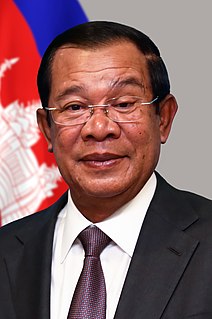A Quote by Loung Ung
From 1975 to 1979 - through execution, starvation, disease, and forced labor - the Khmer Rouge systematically killed an estimated two million Cambodians, almost a fourth of the country's population.
Quote Topics
Related Quotes
Malaria is a disease that kills one to three million people a year. 300 to 500 million cases are reported. It's estimated that Africa loses about 13 billion dollars a year to the disease. Five dollars can save a life. We can send people to the moon; we can see if there's life on Mars - why can't we get five-dollar nets to 500 million people?
Some people have witnessed the killing of their husbands, or they survived other horrific things. My sister is a widow but her husband was killed after the Khmer Rouge. There are different periods in which violence has occurred, and differences in how these women became widowed and how they survived afterwards.
I generally avoid over-population arguments. But there's no question we're in population overshoot. The catch is we're not going to do anything about it. There will be no policy. The usual suspects: starvation, war, disease, will drive the population down. There's little more to say about that really, and it's certainly an unappetizing discussion, but it's probably the truth. In any case, we're in overshoot and we face vast resource scarcities.



































